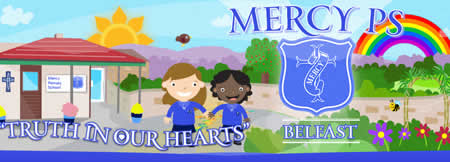- Home
- School Life
- PATHS Social Emotional Learning
PATHS Social Emotional Learning




In Mercy Primary we teach the Paths Curriculum in each class from P1- P7.
- We use puppets, stories and discussion to develop emotional literacy.
- We have "Pupil of the Day" and compliment slips which go home and are shared with others.
- We run friendship groups to enable children to explore their feelings and attitudes to others.
What is the PATHS® Curriculum?
The PATHS® Programme for Schools (UK Version) is designed for use with primary school children. The purposes of The PATHS® Programme for Schools (UK Version) are to enhance the social competence and social understanding of children, as well as to facilitate educational processes in the classroom. The PATHS®Programme for Schools (UK Version) has been adapted for a UK audience by Barnardo’s NI.
The PATHS® Programme for Schools (UK Version) is a programme for educators and counsellors designed to facilitate the development of self-control, emotional awareness and interpersonal problem-solving skills. The programme consists of a variety of lessons, and additional materials and charts.
What Educational Objectives Does the PATHS® Curriculum Fill?
- Increased self-control, i.e., the ability to stop and think before acting when upset or confronted with a conflict situation. Lessons in this area also teach identification of problem situations through recognition of “upset” feelings.
- Contains processes that lead to an appropriate sense of self-responsibility.
- Increased understanding and use of the vocabulary of logical reasoning and problem-solving, e.g., “if…then” and “why…because.”
- Increased understanding and use of the vocabulary of emotions and emotional states; e.g., excited, disappointed, confused, guilty, etc. Increased use of verbal mediation.
- Increased ability to recognise and interpret similarities and differences in the feelings, reactions and points of view of self and others.
- Increased understanding of how one’s behaviour affects others.
- Increased knowledge of, and skill in, the steps of social problem-solving: stopping and thinking; identifying problems and feelings; setting goals; generating alternative solutions; anticipating and evaluating consequences; planning, executing and evaluating a course of action; trying again if the first solution fails.
- Increased ability to apply social problem-solving skills to prevent and/or resolve problems and conflicts in social interactions.
- An effective social-cognitive programme is important because children often show difficulties in social problem-solving, self-control, affective understanding and self-esteem.
Mercy Primary School, 612 Crumlin Road Belfast County Antrim BT14 7GL | Telephone: 028 9039 1670
WEBSITE BY: SCHOOLWEBDESIGN.NET | Login
 Menu
Menu
